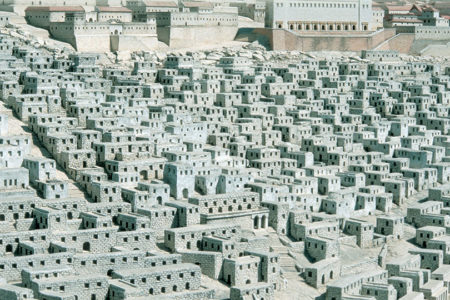God is Glorious Conclusion
The previous article examined two ways in which God has manifested His glory during history: (1) through His created universe and (2) through unique, historic events. This article will examine two more ways.
Nation of Israel
God also manifests His glory through the nation of Israel. God assigned the title “Israel, my glory” to that nation (Isa. 46:13) and said of Israel, “I have created him for my glory” (Isa. 43:7) and “the LORD hath . . . glorified himself in Israel” (Isa. 44:23).
God’s means of glorifying Himself through Israel is His historic dealings with that nation. Early in Israel’s history, Moses promised the Israelites that if they would heed and obey God’s Word, God would do the following for them:
The LORD thy God will set thee on high above all nations of the earth;…The LORD shall cause thine enemies who rise up against thee to be smitten before thy face; . . . And the LORD shall make thee the head, and not the tail; and thou shalt be above only, and thou shalt not be beneath (Dt. 28:1, 7, 13).
Moses also promised that if the Israelites rejected and disobeyed God’s Word (Dt. 28:15), then the following would happen to them:
The LORD shall send upon thee cursing, vexation, and rebuke, in all that thou settest thine hand to do….Therefore shalt thou serve thine enemies whom the LORD shall send against thee….And the LORD shall scatter thee among all people, from the one end of the earth even unto the other….And among these nations shalt thou find no ease, neither shall the sole of thy foot have rest; but the LORD shall give thee there a trembling heart, and failing of eyes, and sorrow of mind. And thy life shall hang in doubt before thee; and thou shalt fear day and night, and shalt have no assurance of thy life (Dt. 28:20, 48, 64–66).
When God would bless Israel above all other nations in return for its heeding and obeying His Word, all people of the earth would see that the Israelites were associated with the Lord and would fear them (Dt. 28:10). When God would severely chasten Israel in return for its rejecting and disobeying His Word, the nation would “become an astonishment, a proverb, and a byword” among the nations (Dt. 28:37); and Israel’s chastening would be upon it “for a sign and for a wonder” (Dt. 28:46).
These statements indicate that God intends to manifest His glory through Israel by making that nation an object lesson to the rest of the world. His historic dealings with Israel are designed to impress the people of the world with two great truths concerning Himself. First, He is the kind of God who will bless those who will heed and obey His Word. Second, He also is the kind of God who will curse, vex, and rebuke those who will not.
It is no mistake that in ancient times, God placed Israel in the most strategic geographical location on the face of the earth. The land of Israel was the crossroads of three great continents: Africa, Asia, and Europe. And it is no mistake that in modern times, God has placed a nation-state of Israel back in that same strategic geographical location. Notice how frequently the world’s attention is drawn to that nation despite its small size.
Future Manifestations. At least two incredible manifestations of God’s glory through Israel are yet to come in conjunction with the future seven-year period of tribulation.
First, God revealed that in the latter times, when Israel will be restored to its homeland and dwell safely there, it will be invaded by a large, combined military force from six nations (the names, as they were known in Ezekiel’s time, are in Ezekiel 38:1–16).
God will react with supernatural fury and wrath to destroy these invaders in the mountains of Israel (Ezek. 38:18–22). He thereby will impressively magnify and sanctify Himself “in the eyes of many nations” (Ezek. 38:23).
Second, near the end of the Tribulation, all the Gentile nations will send their political leaders and armed forces against Israel in the Middle East (Joel 3:9–12; Zeph. 3:8; Zech. 12:2–3; 14:2; Rev. 16:12–16; 19:19).
Two-thirds of the Jewish people in the land will perish (Zech. 13:8). The one-third remnant will be surrounded in Jerusalem (Zech. 13:9; 14:2). In desperation it will cry out to God for deliverance (Zech. 13:9). God will respond by sending Jesus Christ from heaven (Zech. 12:10).
The remnant will, in faith, embrace the Messiah (Zech. 12:10–14). God will cleanse them of their sin (Zech. 13:1). Then Christ will destroy the political leaders and armed forces of all the nations that have come against Israel (Joel 3:12–17; Zeph. 3:8; Zech. 12:3–4, 8–9; 14:3, 12–15; Rev. 19:11, 20–21).
Glory-Fire of God
God also has manifested His glory through fire.
This glory-fire appeared to Moses at the burning bush (Ex. 3:2–3). It appeared as a pillar of fire enshrouded in a cloud during Israel’s Exodus journey from Egypt (Ex. 13:21–22; 14:24) and wilderness wandering (Ex. 16:10; Neh. 9:19).
It came to the top of Mount Sinai when God met with Moses to give the Law to Israel (Ex. 19:9, 16–18; 24:12, 15–18). It came to the Tabernacle (Ex. 40:34–38) and Israel’s first Temple (2 Chr. 7:1–3) when they were dedicated as God’s worship structures. God’s glory-fire remained continuously with the nation of Israel for several centuries.
Its Significance. Every time the glory-fire appeared, it signified that God was present in a unique sense. At the burning bush it signified that God was present to appoint Moses as His deliverer of Israel from its slavery in Egypt. During Israel’s Exodus from Egypt and wilderness journey, it signified that God was with the nation to guide, protect, and provide for it.
When the glory fire descended to Mount Sinai, it indicated that God had come there to enter into covenant relationship with Israel. Its coming to the Tabernacle and Temple revealed that God was coming to dwell in a unique sense in those structures.
Because the glory-fire remained with Israel for several centuries and signified God’s unique presence, through time it became known as the Shekinah Glory of God. The term Shekinah is derived from a word that means “to dwell.”1
Sometimes the glory-fire signified that God was present to judge. For example, God’s glory-fire appeared when He judged Israel for lack of faith at Kadesh-barnea (Num. 14:10, 20–23, 28–37). On other occasions it signified that God was present to administer grace. One instance was the appearance of God’s glory-fire when He commissioned Moses to lead Israel out of slavery (Ex. 3:2–10).
Its Effects. The glory-fire of God had significant effects on people and things. At the burning bush it made the surrounding land holy and caused Moses to hide his face in fear (Ex. 3:2–6).
It protected the Israelites and discomfited the Egyptian chariot force at the Red Sea (Ex. 14:19–25). It caused Mount Sinai to quake, burn, and become engulfed by flashes of lightning, loud claps of thunder, smoke, and a thick cloud (Ex. 19:16–18; Dt. 5:23; 9:15).
It caused the Israelites to withdraw out of fear of being consumed (Ex. 20:18–21; Dt. 5:5, 23–26; 18:16). It made Moses’ face glow with a brilliant radiance that necessitated a veil on his face because of the Israelites’ fear (Ex. 34:29–35).
It sanctified the Tabernacle (Ex. 29:43) and made it impossible even for Moses to enter that structure for a while (Ex. 40:33–35). Its presence on the mercy seat in the most holy place of the Tabernacle necessitated a veil between the most holy and holy places lest people be stricken dead (Ex. 26:33–34; Lev. 16:2). When it consumed sacrifices, the Israelites shouted and fell on their faces in fear (Lev. 9:23–24).
While the glory-fire remained in Israel’s first Temple in Jerusalem, that structure and city were protected from destruction. Once it departed because Israel rejected God (Ezek. 8—11), the Temple and Jerusalem were vulnerable to total destruction by the Babylonians in 586 B.C. (Jer. 52:12–14). The departure of the glory-fire signified the withdrawal of God’s protective presence (Jer. 52:3).
These effects reveal that God designed the glory-fire to impress mankind with two aspects of His nature: His “unapproachable holiness and terrifying power.”2
Its Special Manifestation. Nowhere in the Old Testament did the glory-fire of God inhabit human flesh. That changed with Jesus of Nazareth. The apostle John wrote of Him, “And the Word was made flesh, and dwelt [literally, tabernacled] among us (and we beheld his glory, the glory as of the only begotten of the Father)” (Jn. 1:14).
John saw the glory-fire of God in Jesus’ flesh when Jesus was transfigured before him, Peter, and James (Mt. 17:1–6). Jesus’ flesh radiated a brilliant light (Mt. 17:2). A bright cloud appeared overhead, and God spoke from that cloud (Mt. 17:5; 2 Pet. 1:16–18). John, Peter, and James knew from their nation’s history that the light in the cloud was the glory-fire of God enshrouded in a cloud, the same manifestation of God that appeared to Israel in Old Testament times.
As they compared the light in the cloud with the light in Jesus’ flesh, they recognized that they were the same. Thus the light in Jesus’ flesh was the Shekinah glory of God. As a result, they fell on their faces and were “very much afraid” (Mt. 17:6), reacting the same as the Israelites when they saw the gloryfire of God in Old Testament times.
This embodiment of the Shekinah glory in Jesus’ body signified that He was God in human flesh. Just as the appearance of the glory-fire of God in the Tabernacle and Temple signified that God was present in a unique sense to dwell, or tabernacle, in the midst of the people of Israel, so the appearance of God’s glory-fire in Jesus’ flesh signified that, once again, deity was present in a unique sense to dwell in the midst of His people Israel.
Because of the glory-fire of God in Jesus’ flesh, several statements concerning Him were extremely appropriate. Matthew stated that, in fulfillment of Isaiah 7:14, Jesus would be called Immanuel, which means “God with us” (Mt. 1:23). Simeon, a devout Jew, said Jesus was “a light to lighten the Gentiles, and the glory of thy people, Israel” (Lk. 2:32).
Referring to Jesus, John said, “the Word was God” (Jn. 1:1). Jesus called Himself “the light of the world” (Jn. 8:12) and His body a temple (Jn. 2:19, 21).
Paul designated Him “the Lord of glory” (1 Cor. 2:8) and said that He is “the image of the invisible God” (Col. 1:15) and “in him dwelleth all the fullness of the Godhead bodily” (Col. 2:9). The writer of Hebrews declared that Jesus is “the brightness of his [God’s] glory, and the express image of his person” (Heb. 1:3).
Conclusion
Because God is the “God of glory” (Acts 7:2) and the “King of glory” (Ps. 24:7–10), mankind is to ascribe glory to Him (Ps. 96:7–8) by declaring what is impressive concerning God.
ENDNOTES
- J. Barton Payne, The Theology of the Older Testament (Grand Rapids: Zondervan, 1962), 361.
- Walther Eichrodt, Theology of the Old Testament (Philadelphia: The Westminster Press, 1967), 2:18.






